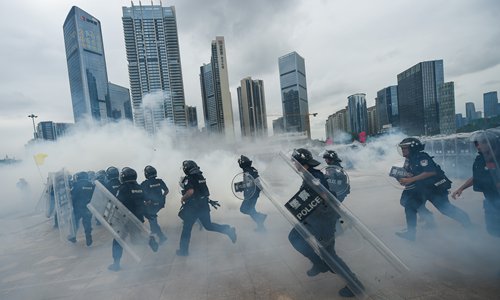HOME >> CHINA
Central govt official identifies HK turmoil as ‘color revolution’ for first time
By Yang Sheng in Hong Kong Source:Global Times Published: 2019/8/7 22:58:21

Police officers take part in a drill to maintain social stability in the city of Shenzhen, South China’s Guangdong Province, on Tuesday. The drill attracted wide attention as it features scenarios that resemble the ongoing riots in the neighboring city of Hong Kong. Photo: IC
The anti-extradition bill protests in Hong Kong have gone bad and have had obvious characteristics of a "color revolution," said a senior official in China's central government who is responsible for Hong Kong affairs.
Zhang Xiaoming, director of the Hong Kong and Macao Office of the State Council, made the remarks on Wednesday at a closed-door symposium jointly held by the office and the Liaison Office of the Central People's Government in Shenzhen, South China's Guangdong Province, which borders the Hong Kong Special Administrative Region (HKSAR).
This is the first time a central government official has used "color revolution" to describe the recent incidents in Hong Kong.
Challenging the "one country, two systems" principle is absolutely unacceptable, Zhang said, adding that during the recent protests and violent activities, some people shouted "Hong Kong-independence" and "liberate Hong Kong." They also tried to storm the Liaison Office of the Central Government and smeared and insulted the national flag and the national emblem.
"So just as many Hong Kong people said, the movement about the extradition bill has gone bad, and it has gone bad with clear color revolution characteristics," Zhang noted.
"Using color revolution to describe the protests is a very significant signal and the HKSAR government and the society of the city should be alarmed," Tian Feilong, a Hong Kong affairs expert and associate professor at Beihang University in Beijing, told the Global Times.
"The color revolution is a very serious identification. It means the turmoil is intended to paralyze the HKSAR's governance and damage the city's prosperity and stability, which means the central government has to get involved comprehensively if the situation totally gets out of control," Tian said.
More than 550 people attended the meeting, including HKSAR deputies to the National People's Congress, national and provincial political advisors from the HKSAR, leaders of patriotic political and social organizations in Hong Kong, and representatives from youth, education and professional organizations and mainland enterprises operating in Hong Kong.
"Hong Kong is facing the most severe situation since its return to the motherland," Zhang said.
PLA and armed police
After the symposium, Tam Yiu-chung, a member of the Standing Committee of the National People's Congress, told the Global Times that during the meeting, Zhang quoted former Chinese leader Deng Xiaoping's remarks about the PLA Hong Kong Garrison in 1984 and 1987. The quotes mentioned that if massive turmoil occurs in Hong Kong and the HKSAR government cannot handle it effectively, the PLA will get involved to stabilize the situation.
"Zhang also said 'Deng was far-sighted,' but Zhang didn't say anything directly about sending the PLA to reinforce Hong Kong at this moment," Tam said.
Zhang said at the symposium that the central authorities will never sit by if the situation in Hong Kong worsens to a level that the SAR government cannot control, the Xinhua News Agency reported.
"According to the Basic Law (of the HKSAR), the central authorities have ample methods as well as sufficient strength to promptly settle any possible turmoil," he said.
Tian said "according to Article 14 of the Basic Law of HKSAR, the PLA would be used when the HKSAR government asks for assistance from the central government. But according to Article 18, when a 'state of emergency' occurs, forces including the mainland police and armed police forces could also be used. The PLA is not the only choice."
Mainland experts on the Basic Law and officials should start to make efforts to research the basic law and find a legal basis for any kind of necessary intervention if the situation gets worse, Tian noted.
Support govt and police
The most pressing and overriding task for Hong Kong is to stop the violence, end the chaos and restore order, Zhang remarked.
Starry Lee Wai-king, chairperson of the largest pro-establishment political party in the HKSAR, the Democratic Alliance for the Betterment and Progress of Hong Kong (DAB), told the Global Times that the best way to settle the current situation is to firmly support the police to conduct strict law-enforcement, and the HKSAR government should have effective communication with different groups to find a solution to break the deadlock.
Posted in: HK/MACAO/TAIWAN,CHINA FOCUS